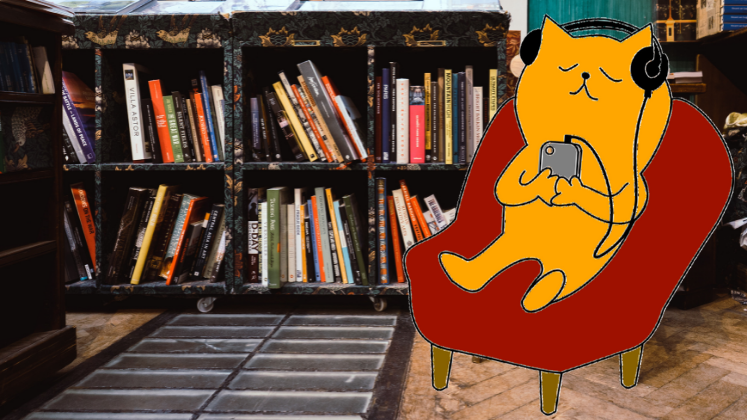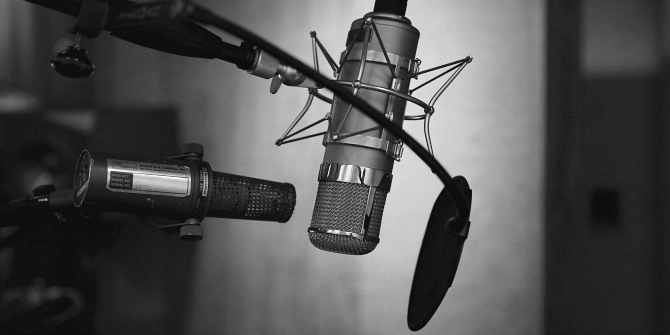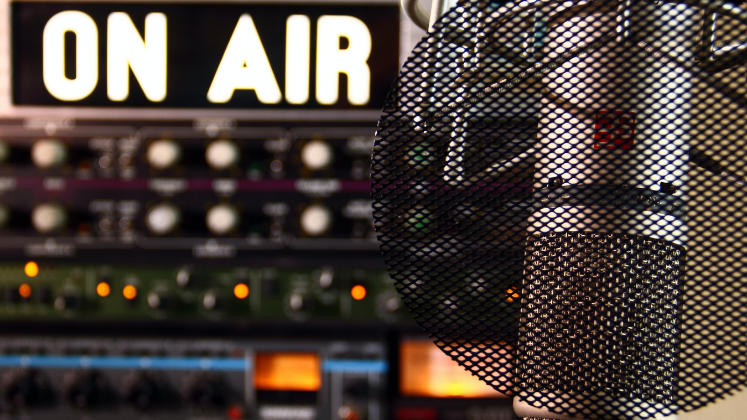Podcasts have become an established part of university communications and public engagement activities. Reflecting on the development of the medium and the creation of the ‘Isolation Pod’ podcast during the first COVID-19 lockdown in the UK, Mark Carrigan makes the case for the wider use of podcasts by academics in a lo-fi fashion, where increasingly high production standards are eschewed for more direct and focused audio engagements.
I produced my first podcast over a decade ago. It was an interview with political sociologist Colin Crouch about his concept of Post-Democracy. The resulting conversation was high in intellectual content, low in production values, but I was so enthused by what I’d just made that this limitation didn’t occur to me. It just felt amazing to have had a fascinating conversation with a leading thinker, which could then be shared with other people. For a hyperactive part-time PhD student, the realisation that people whose books I had read would happily answer my questions if it was recorded was intoxicating.
I eventually found myself in a position where I was being paid to podcast, as part of a broader research communication role. Oddly this is where my podcast habit was broken and it ceased to be something I enjoyed. It might be that any hobby feels different if you suddenly find yourself paid to do it. But there was a pressure to increase audio standards that was specific to podcasting in this newly professional capacity.
I was initially excited to be supported by a professional audio producer. Horrified by the low-fi way in which I’d been recording podcasts, I was pressured to buy expensive new equipment that I was barely able to fit in a large rucksack (previously I had been using a pocket sized voice recorder). The concerns I raised about being able to travel with this equipment and operate it on my own without support were ignored, leaving me with the impression there was only one ‘right’ way to record audio to which I needed to adapt. It was simply impossible for me to continue in the way I previously had, arranging podcasts around conferences and research visits in which I picked up on a longer e-mail exchange through a relatively informal conversation recorded on my Olympus LS-5. I tried to use the new equipment but it simply wasn’t possible to do this on my own. Instead of upgrading the quality of my podcasting hobby, this intervention had effectively killed it.
the conversation itself moved to the periphery and the technical challenges involved in producing adequate sound were instead at the forefront of my experience.
The problem was that it ceased to be something I could easily do on my own, breaking the connection with my own intellectual curiosity. In this sense the conversation itself moved to the periphery and the technical challenges involved in producing adequate sound were instead at the forefront of my experience. It went from being an amateur undertaking, motivated by a love of the conversations involved, to a professional one, which I was ill equipped to undertake, even with my prohibitively bulky new equipment.
I regained my early enthusiasm for podcasting during the first lockdown, when Jana Bacevic and I produced a podcast in which we explored how celebrity social theorists were making sense of the Covid-19 crisis through the ‘hot takes’. These were conversations we were having anyway and this meant there was little preparation involved in each episode. There was no professional ambition behind a podcast that was a project to stave off lockdown boredom, coupled with a curiosity about how others would respond to these conversations. It was an immensely enjoyable process which also constituted a form of theoretical sense-making as a newly public structure to the conversation helped us conceptualise the experiences we were going through.
Before each recording we would briefly discuss the topics we wanted to explore, as well as the order in which we would address them. The episode itself would be an informal and free flowing conversation, with opening and closing credits sampled from music recorded by our friends Wanya Whyne and Steve Watson (thanks also to Milan Stürmer for suggesting the name Isolation Pod for the series). If we had said something we later regretted then we removed this from the episode, but unless this threshold of embarrassment was reached then we released the conversation unedited. This meant that there was at most thirty minutes work involved in each episode, including writing show notes and releasing through social media. In part this reflects the affordances of the Anchor.fm platform which is designed to facilitate this low-cost process of making conversations publicly available quickly and easily.
We produced eight episodes over three months from March 2020 through to June 2020. The audience for the episodes ranged from 90 to 408 for the most popular. The granular metrics provided by Anchor showed listeners skipping through the podcast, but also that around half of them tended to listen to the full episode. There are obvious points for improvement suggested by the metrics, such as breaking up the conversations in a more systematic way and reducing the length of the opening credits which people often skipped over. It is possible that we could have significantly increased the audience of the podcast through more careful planning here. However, it is unlikely we would have produced the number of episodes we did or maintained such a relaxed style, if this had been framed as a serious work project in which our reputations might hinge on the standard of audio production. The commitment we had to the conversation itself meant that the audience was a secondary consideration at most, although it was certainly nice that people were listening.
Lo-fi podcasting isn’t a call for to lower the production values of scholarly audio. There are still thresholds below which it is simply difficult to listen in an engaged way
The reason for sharing this case study is that I’m concerned the expectation of radio quality production gets in the way of creative and casual uses of podcasting. I could not be more excited by the research funding which has gone into producing multimedia within higher education. However, this influx of funding, coupled with the ratcheting up of production values for popular podcasts funded via Patreon, creates an expectation which academics can’t meet without the support of professional media producers. There was wide range of more causal uses, what I refer to as lo-fi podcasting, during the early stages of the medium. Since then, the barriers to participation haver radically shrunk through the quality of audio which can be captured through a modern smart phone and the ease with audio can be edited, uploaded and made public. But, rather than encourage a wider culture of audio scholarship, the new podcasts we’ve seen tend towards the professionalised.
Lo-fi podcasting isn’t a call for to lower the production values of scholarly audio. There are still thresholds below which it is simply difficult to listen in an engaged way, with the raising of expectations driven by the wider audio landscape making it likely this will gradually increase with time. But, I suggest that many podcasts vastly exceed this threshold and in the rush towards radio quality, we tend to lose sight of questions of exactly what we are trying to do and what this means for how we produce audio.
We also tend to automatically see academic podcasting through a broadcast lens in which we imagine it will be available to a vast and dispersed audience. This might be appropriate for a public engagement podcast, though even then it suggests a tendency to think in terms of an imagined ‘general public’. If we see academic podcasting through a narrowcasting lens, in which we are trying to facilitate conversations with specific and often specialised audiences, the standards adopted should be ones suitable to the size and tastes of the group you are addressing. If you are using a podcast to consolidate a research network or share ideas within a narrow field built around existing connections, there is far more latitude for what I am describing here as the lo-fi.
It can also be an immensely enjoyable experience to produce scholarly audio in a way which centres the conversations you are having, without excessive concern for the broadcast quality of what you produce. In making this argument I’m not attacking the hugely impressive podcasts which some academics are undertaking. I’m simply reminding everyone there’s a much wider range of ways in which audio scholarship can be used and suggesting we should not forget about the more casual uses which can be made of podcasts within higher education.
The content generated on this blog is for information purposes only. This Article gives the views and opinions of the authors and does not reflect the views and opinions of the Impact of Social Science blog (the blog), nor of the London School of Economics and Political Science. Please review our comments policy if you have any concerns on posting a comment below.
Image Credit: LSE Impact Blog via Canva.









Just yesterday I responded to a post on H-Podcast (https://networks.h-net.org/node/84048/discussions/10478210/journal-american-history-podcast-state-field#reply-10480539) in which editor Robert Cassanello was ruing the push by some academic podcasters to sacrifice content for popularity. I argued that low barriers to entry — you address those in your post — created a space for “labor of love” podcasts the emphasized the producer and content rather than the consumer’s tastes.
I also compared what you call lo-fi podcasts to the pirate radio stations of yore — hyper-local audiences addressed by a “quick hit” of the pirate broadcaster.
Good work on this post. Thanks.
Really interesting post Mark. I’m all for ‘labour of loves’ and podcasting can sometimes feel like that. In common with any piece of communication, a key question is, “Will this reach the people that I want to ‘talk to’?” And if that audience is 10, 50, 100, is this an efficient way to do it? And if you don’t care, that’s fine but people should be honest/realistic about it. You were already familiar with some of the skills to record, edit, interview and upload but others will have to put in a bit more work to get to grips with this – of course none of this is insurmountable.
Also promoting your podcast to your audience is key – the “build it and they will come” approach is rarely effective. Online podcast support groups are replete with people who are disappointed at how few listeners they get. Again, because of your profile and knowledge in this area, you were probably several steps ahead in this respect.
Researchers shouldn’t dismiss offering to do an interview for an existing podcast with an established audience – many podcasters are hungry for interviewees and it could be a useful way to get an insight into the medium.
Thanks for the thought provoking post!
It is so refreshing to hear others in higher education using the terms and arguing the case for lo-fi and narrowcasting and celebrating audio as an accessible space rather than more complex and expensive approaches that, as you note, become a barrier and a demotivation to academic producers.
Many thanks for this and the comments.